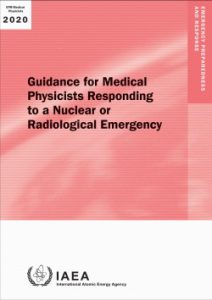The medical management of individuals involved in a nuclear or radiological emergency requires specially trained personnel. Lessons learned from previous events have demonstrated that caring for these individuals calls for a multidisciplinary team of health care professionals if the response is to be effective.
All hospitals offering medical radiation services (e.g. radiology, radiotherapy, nuclear medicine) have medical physicists who are part of the clinical team, with special responsibility for the proper and safe application of ionizing radiation. Using this reservoir of radiation protection experts in emergency and preparedness teams is good medical practice.
Clinical medical physicists working in hospitals have in-depth knowledge of radiation dosimetry, dose reconstruction and dose measurement procedures. They constitute a unique group of professionals who, with the appropriate training, can provide effective support for emergency preparedness and response activities.
Some sections of this publication were developed under the NA/21 Project supported by the Government of Japan within the IAEA Action Plan on Nuclear Safety, in cooperation with the International Organization for Medical Physics.
This publication has been endorsed by the American Association of Physicists in Medicine, European Association of Nuclear Medicine, International Association of Radiopathology, International Federation of Red Cross and Red Crescent Societies, International Organization for Medical Physics and Latin American Association of Societies of Nuclear Medicine and Biology.
The IAEA officers responsible for this publication were E.D. Herrera Reyes of the Incident and Emergency Centre, and T. Berris and A. Meghzifene of the Division of Human Health.
Nguồn tài liệu: https://www.iaea.org/publications/13483/guidance-for-medical-physicists-responding-to-a-nuclear-or-radiological-emergency

